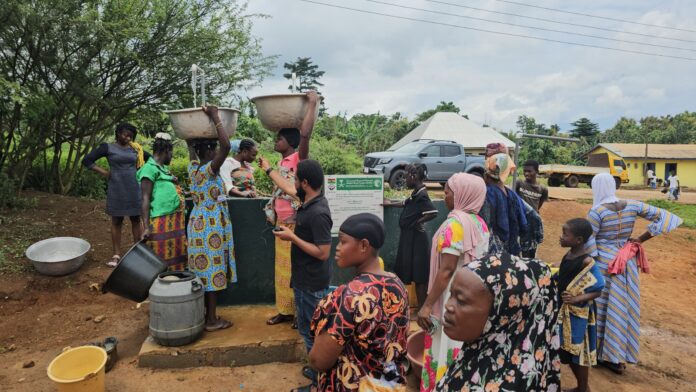The critical link between water and poverty cannot be understated. The relationship between the absence of clean water and poverty is mutually reinforcing, with access to safe and reliable water sources playing a crucial role in alleviating poverty.
According to projections from the United Nations, by the year 2030, there will be a significant deficit of 40% in water supply compared to demand. This scarcity of freshwater is becoming more pronounced in regions vulnerable to drought, a situation exacerbated by factors such as climate change, population growth, and over-exploitation of water resources. With over two billion people lacking access to safe water and sanitation, achieving the UN’s goal of universal access by 2030 appears to be a daunting challenge.
In light of this pressing issue, the humanitarian organization Markaz Aleawn Alyaqin (MAA) has taken action by providing clean water to 52 communities in the Ashanti, Bono, Western North, and Northern regions of Ghana. These clean water sources have reached communities such as Tolon, Mion, Savelugu, Bimbilla, Nakpachie, Gbambuni No 1 in Yendi, Sawaba, Gamborongo-Awiadoone, Sunyani Zango, Sefwi Asawinso, Adankwame, Sekyeredumase, Wiamoase, Amanten Senior High Senior, and Mampong Bosofour, among others.
The water supply project, funded by the King Salman Humanitarian Aid and Relief Centre, includes a 15-cubic storage tank connected to strategically placed standpipes in each community. Water is sourced from mechanized boreholes equipped with photovoltaic systems and distributed through transmission and distribution lines, benefiting both people and animals in the areas and neighboring communities.
MAA’s Executive Director, Ismail Mohammed Kamil, emphasized the critical importance of providing clean water, not just for individuals but for entire communities. He stressed the goal of ensuring access to safe water for various household purposes, including cooking, washing, and sanitation.
Recognizing access to clean water and sanitation as a fundamental human right, the United Nations General Assembly officially acknowledged this right in 2010. Lack of access to safe water and sanitation significantly impacts the health, dignity, and overall well-being of billions of people, affecting the realization of other human rights as well.
In 2015, the United Nations adopted seventeen Sustainable Development Goals, including Goal 6, which aims to ensure universal access to sustainable and clean water supply and adequate sanitation for all individuals by 2030. Ismail highlighted the interconnectedness between poverty and the absence of clean water, stating that improving and sustainably managing water resources contributes to economic development and poverty reduction.
Residents of communities benefiting from these clean water sources expressed gratitude for the project, noting improvements in their daily lives and tasks. Women and children, who previously spent hours fetching water, now have easier access to clean water, which is expected to enhance their well-being and economic opportunities.
This initiative not only addresses the immediate need for clean water but also underscores the broader impact on social and economic development when communities have access to this vital resource. Through collaboration and commitment, projects like these can make a significant difference in improving the lives of individuals and communities across Ghana.

